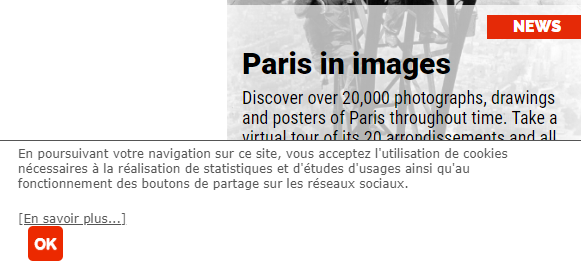The National Library of France (Bibliothèque nationale de France) has a delightful site called Gallica, in which you can see a huge variety of the library’s precious treasures in digital form. If you visit from the United States, the home page automatically defaults to English, so that you can browse without knowing a word of French.
Except that you are required to agree to a little stipulation:
“En poursuivant votre navigation sur ce site, vous acceptez l’utilisation de cookies nécessaires à la réalisation de statistiques et d’études d’usages ainsi qu’au fonctionnement des boutons de partage sur les réseaux sociaux.”
To get rid of that notice, you must agree (by clicking a button labeled, amusingly enough, “OK”).
What do you suppose a lawyer would think about a site in English that makes us agree to a stipulation in a foreign language—one to which we agree simply by using the site in English? (A translation: “By continuing your navigation on this site, you accept the use of cookies necessary for gathering statistics and studying usage as well as for the operation of sharing buttons for social networks.”)
Even as he poses the question, Dr. Boli knows the answer. The answer is that any good intellectual-property lawyer is thinking to himself, “Boy, I wish I’d thought of that.”
